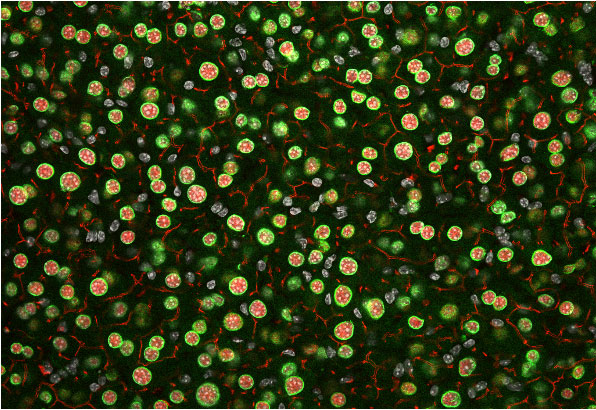Neuherberg, 08.02.2022
Important Step Towards Fasting-Based Therapies
Voluntary fasting, for example interval fasting, is beneficial to health for many people, depending on their individual condition. For example, controlled periods of starvation can prevent and improve diseases such as diabetes and obesity. Researchers have now found that the immune system plays an important role in ensuring the positive effects of fasting on our bodies. The new findings will help develop more effective therapies based on fasting.
Previous studies have shown how fasting can influence the immune system to improve different chronic inflammatory conditions, but little is known about how immune responses might determine a healthy metabolism. Since the liver is a central hub and regulator of metabolism, a group of researchers focused on understanding how liver cells and immune cells found in the liver communicate with each other in conditions of fasting. The study was a joint effort of Helmholtz Munich, Ulm University, the Technical University of Munich (TUM), the German Center for Diabetes Research (DZD), the Heidelberg University Hospital, and the University of Southern Denmark.
Immune activity is necessary for metabolic response to fasting
The researchers scanned the DNA of liver cells and immune cells, examining which parts of their DNA were active and which messenger-molecules were being released as a result. Their findings showed that these cells were communicating with one-another and highlighted the role of a molecule that is expressed in almost all the cells in our bodies, namely the glucocorticoid receptor. “We discovered that in the immune cells, this receptor in particular allowed the crosstalk between the cell types during fasting. By deleting the receptor only in the immune cells, we saw a breakdown of fasting signals in the liver cells. This means that the immune cells are able to directly influence the effect of fasting on our metabolism,” says Anne Loft from Helmholtz Munich.
Giorgio Caratti and Jan Tuckermann from the Ulm University add: “In fact, this is the first time we have seen this process under ‘healthy’ conditions. We knew that immune responses could influence our metabolism in an unhealthy setting, but this was new. It proves that a low level of immune activity, or inflammation, is necessary for a balanced metabolic response to fasting.”
Future work
“Voluntary fasting has been shown to be beneficial for the prevention of a number of human metabolic diseases, including type 2 diabetes and obesity. The increase in people suffering from not only these metabolic diseases is staggering, showing no signs of slowing down. Our findings serve to understand the molecular mechanisms behind these diseases and may ultimately lead to the development of effective fasting-based therapies,” says Stephan Herzig who led study at Helmholtz Munich.
About the people
Prof. Stephan Herzig is Director of the Helmholtz Diabetes Center at Helmholtz Munich. He holds the Chair for Molecular Metabolic Control at TUM and an Honorary Chair at Heidelberg University. Dr. Anne Loft is first author of the study at Helmholtz Munich. Both are part of the German Center for Diabetes Research (DZD). Dr. Giorgio Caratti from the Ulm University is co-author of the study and works at Prof. Jan Tuckermann’s lab who led the study together with Stephan Herzig.
Original publication:
Loft et al., 2022: A macrophage-hepatocyte glucocorticoid receptor axis coordinates fasting ketogenesis. Cell Metabolism, DOI: 10.1016/j.cmet.2022.01.004.
About Helmholtz Munich
Helmholtz Munich is a leading biomedical research center. Its mission is to develop breakthrough solutions for better health in a rapidly changing world. Interdisciplinary research teams focus on environmentally triggered diseases, especially the therapy and prevention of diabetes, obesity, allergies and chronic lung diseases. With the power of artificial intelligence and bioengineering, the researchers accelerate the translation to patients. Helmholtz Munich has more than 2,500 employees and is headquartered in Munich/Neuherberg. It is a member of the Helmholtz Association, with more than 43,000 employees and 18 research centers the largest scientific organization in Germany. More about Helmholtz Munich (Helmholtz Zentrum München Deutsches Forschungszentrum für Gesundheit und Umwelt GmbH): www.helmholtz-munich.de/en
Press contact

Birgit Niesing
niesing(at)dzd-ev.de
+49 (0)89 3187-3971

